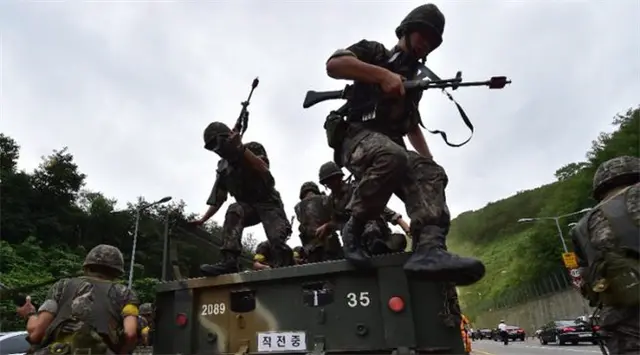South Korea's parliament on Wednesday passed the country's first anti-terror bill, with opposition lawmakers leaving the plenary chamber after ending the 9-day marathon speeches.
Among almost 300 parliamentary seats, only 156 ruling Saenuri Party lawmakers and one minority party member participated in a vote on the country's first anti-terrorism legislation, which was passed through the National Assembly with 156 in favor. One dissenting vote was cast by the minority party member.
The bill, which was first brought up in South Korea in 2001 after the 9/11 terrorist attacks in the United States, had repeatedly failed to be enacted due to worries about abuse of power by the country's spy agency.
Opposition lawmakers launched nonstop speeches to delay the vote on the country's first anti-terror bill from Feb. 23 when the parliamentary speaker sought to put the bill on a vote with his own authority.
A total of 38 opposition lawmakers participated in the filibuster that ran for 192 hours and 25 minutes through Wednesday night.
Lee Jong-Geol, floor leader of the main opposition Minju Party and the last speaker of the filibuster, set a record for his marathon speech that didn't stop for 12 hours and 31 minutes.
The country's filibuster, invoked for the first time in 38 years, was aimed at blocking the passage of the bill which triggered fears that it may grant excessive power to the National Intelligence Service (NIS).
The anti-terror legislation will allow NIS agents to collect personal information, location and conversation in mobile phones from suspected terrorists, while enabling the agency to track bank accounts and immigration records of the suspects.
Opposition lawmakers had opposed to the bill as it will cause the abuse of power by the NIS, which has a history of spying on civilians and journalists and interfering with politics.
Former NIS chief Won Sei-hoon was sentenced to three years in prison last year for ordering an illicit online smear campaign against Moon Jae-in, then-main opposition party presidential candidate and archrival to current President Park Geun-hye during the 2012 presidential election. The Supreme Court has ordered a new trial for him after rejecting some of evidences.
Two former NIS heads under the Kim Dae-jung government from 1998 to 2003 received suspended jail terms for instructing the monitoring of mobile phone conversations of hundreds of politicians, businessmen and journalists.
President Park Geun-hye had strongly called on the parliament to pass the anti-terror bill, citing escalating threat of terrorist attacks from the DPRK following its latest rocket launch and nuclear test.
According to the NIS report, top DPRK leader Kim Jong Un has recently ordered officials to muster up capability of anti-South Korea terrorist attacks without elaborating on where the agency got the information.
Pyongyang conducted its fourth nuclear test on Jan. 6 with the detonation of what it claimed was its first hydrogen bomb, and went ahead with the launch of a satellite aboard a long-range rocket, which was condemned by the international society as a test of banned missile technology, on Feb. 7.
 简体中文
简体中文





